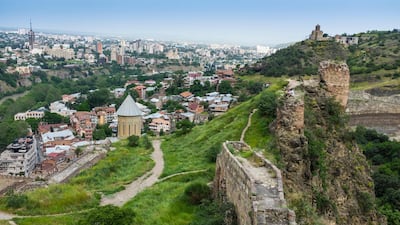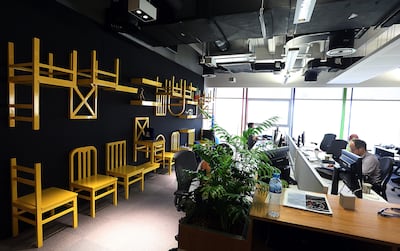I feel quite at home in the Google canteen. There’s a good selection of free food – a hot and cold buffet, snacks, great coffee and fridges full of coconut water and Badoit. And, as expected in Dubai Internet City, free Wi-Fi. Ivan Jakovljevic – Google’s head of travel in the Middle East and North Africa – has also arrived early for our meeting and suggests we share a bowl of freshly cut mango for dessert. I hadn’t seen the mango. “You have to ask for it!” he tells me. “It’s good mango!” And it is.
Jakovljevic, who is from Serbia and has been in Dubai for 10 years, clearly enjoys leaving the virtual world to actually travel in the real one. He’s been to more than 50 countries, and relishes the chance to take off on a new route, most memorably, in recent experience, to Georgia, which he says is becoming increasingly popular with UAE travellers and is only a three-and-a-half-hour flight away. “I went there for a ski trip. I’m an aspiring snowboarder, and I found that the experience was very different to what I’m used to in the more traditional ski resorts in Europe. It was more wild, more in touch with nature – it was really a very pleasant experience.”
Cambodia is another recent favourite. “That was very interesting and exotic. In a restaurant I ate crispy tarantula in a lemongrass sauce,” he says.
Previously employed as a management consultant in the cargo and transportation industry, Jakovljevic graduated with a degree in traffic engineering and transportation in Serbia. “Moving people or moving things, that’s what I’m about,” he says.
Now, Jakovljevic’s role mostly involves helping travel providers throughout the Mena region target customers. With 43 per cent of all global travel now being booked online, the UAE and Saudi Arabia are leading the way, with figures at about 35 per cent of trips booked online and rising. With airlines and hotels, Jakovljevic says, we are seeing a constant “channel shift” away from traditional travel agents towards the internet.
“The second thing we have seen is the emergence of digital-first type players, online travel agencies like Booking.com, which is now the strongest travel brand in the region; and of course, there are also local digital travel companies starting up.”
________________
Read more:
Mobile preferred for travel searches but only two Mena airlines fully compliant
Inside Google's Middle East headquarters in Dubai
Top 10 coolest neighbourhoods to visit in 2017
________________
While Jakovljevic’s role mainly relates to advertising, greater choice and transparency means things are far better for consumers than they used to be. “If you remember, 10 or 15 years ago, you would go to a travel agent and they would give you a few different options, and you would have to pick on the spot without necessarily knowing what you were choosing or not choosing.
“Fast forward 15 years, you go online, you see the user reviews, you see the pictures, you see the videos. You can also look for bad experiences, if you’re not comfortable. I think that transparency has definitely created a much more educated traveller. And a much more educated traveller is able to make those decisions in a much better and more efficient way.”
The most fascinating part of Jakovljevic’s job is the insight he gets into our travel habits. “If you think about the traveller’s journey, it starts with a dreaming phase. You don’t necessarily know where you’re going to go, you just know that you have days off, there’s a holiday coming, you know that you want to go somewhere, but you don’t exactly know how.”
For most of us, this involves lying on the sofa at night with a smartphone. “People slowly shift from the inspirational part to research, understanding a little bit more and coming up with a shortlist of destinations – places you want to go to, airlines that you want to be using, a shortlist of hotels that you potentially want to be staying at.”
He says that in the UAE, 40 per cent of travel queries are done through mobile phones (the figure is 60 per cent in Saudi Arabia), and that the majority of these queries are in English, reflecting the large expat community (in Saudi, the majority of travel-related queries are in Arabic). Then, when it comes to air travel, 85 per cent of these queries are “branded queries”, such as “flight with Emirates” or “flight with Etihad” and then a mention of the destination – reflecting local loyalty to regional airlines. But when it comes to hotels, it’s the other way around. Here, 60 per cent of hotel queries don’t contain a brand term, meaning that “it’s more about a particular destination, rather than a hotel of a particular chain”.
Loyalty generally is “quite important”, Jakovljevic says, following recent research Google conducted with TNS, a survey company. “Thirty per cent of the travellers from the UAE, when they were booking, essentially knew which brand they wanted to book. So they were not really shopping around, they knew they were going to go with Emirates or Jumeirah, or whatever. And then, they went to their site and searched for the best price for that particular provider and then booked.” With airline bookings, most of the bookings are made direct through the airline’s websites, as opposed to flight search engines, says Jakovljevic, “and on the hotel side, it would mostly be through online travel agencies like Booking.com”.
Video is particularly important in the UAE and Saudi Arabia, he says. “You go on YouTube, you search for winter sun, for example, or a ski destination – you can see what’s out there and get inspired. Video in general is huge and it’s become even bigger, and it’s especially big in the Mena region. What we’re seeing here, are some of the highest numbers in terms of the online consumption of video per capita in the world.”
There are a number of different reasons for this, he explains. “We [Mena] are one of the most mobile-developed regions of the world. We have a young population, which is very comfortable going online and sourcing information. The local content that is available on TV or other sources of information is sometimes limited, so people go online and find more content there.”
YouTube is particularly popular, with the Arab world second only after the United States in terms of total “watch time” – mobile watch time in the Mena region also grew by 90 per cent between 2016 and 2017, according to data from Google. “A lot of the young people from Saudi and the UAE are putting up videos that they are producing and showcasing their passions and experiences,” Jakovljevic says, adding that while people go online to research trips and be inspired, “they also look at videos to check the quality of the products and services that they will be experiencing”.
Then, he explains, the traveller finally starts to think about going through with the booking. “Once you have made a decision about where you want to go, and shortlisted the airlines and hotels – how do you do it in the most efficient manner? Who are the purveyors or suppliers of choice that you are going to be transacting with?”
At this point, typically between four and four-and-a-half weeks before departure from the UAE, Jakovljevic says, most of us make the actual booking on a desktop computer, though an increasing number are feeling comfortable enough with digital-first sites like Booking.com to make transactions on mobiles, too.
Along with Google’s own travel apps such as Google Trips, Jakovljevic, like about 150 million other people, is a fan of Airbnb. “I find myself using it more and more, but it has less to do with the quality of the app than the value proposition.
“When I travel either for business or personal reasons, I find that I want to stay in the areas where the locals will congregate in a way that will help you to experience the place as if you were living there for a limited period of time, as opposed to just staying in a hotel.”
Jakovljevic's next trips are to the Philippines and South Africa. I just wonder, now, who he'll be flying with and where he'll be staying...



